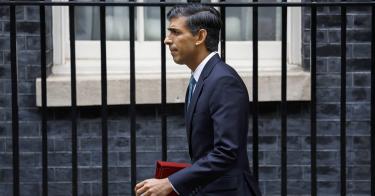Fracking, a new technology to release oil and natural from shale rock, has transformed American energy production. But permission to frack in the U.K. lasted for only a week. In one of his first actions as Britain’s Prime Minister, Rishi Sunak reversed his predecessor Liz Truss’s permission, subject to local consent, to develop some of his country’s reserves of oil and natural gas through fracking.
This must be one of the shortest fracking authorizations in history. Truss’s pro-fracking measure had passed Parliament on October 19. Although the margin was 326 votes to 230, many Conservative members complained of being pressured to support her.
The U.K. by many measures has plentiful reserves that, while not available immediately, could be developed over time.
According to a report on U.K. oil and gas reserves published last year by the U.K. Oil and Gas Authority, the U.K. has 4.4 billion barrels of oil equivalent, enough to last until 2030. Adding probable resources raises the amount to 7 billion barrels, and with possible resources the amount of total contingent resources increases to 11 billion barrels of oil equivalent, of which about 70 percent is oil and 30 percent is natural gas.
>>> What Europe’s Energy Crisis Means for America
As well as emissions from oil and natural gas, environmentalists cite the potential for earthquakes as a reason to leave the oil and gas in the ground. The U.S. Geological Survey concludes that disposal of fluids used for fracking, rather than the fracking itself, is responsible for some small seismic tremors. It is possible to mitigate the effects of disposal with further research, and this should not be a barrier to energy independence.
Energy development is important because the U.K. is facing a shortage which cannot be alleviated through renewables alone. It is clearly unrealistic that to address Britain’s sky-high energy prices, "the government should focus on building more cheap and popular renewables, including onshore wind and solar where there is local support," as Sam Hall, who leads the Conservative Environment Network, stated on Wednesday, when Prime Minister Sunak reimposed the fracking moratorium.
On the same day, the terrorist group Just Stop Oil vandalized the headquarters of the Global Warming Policy Foundation in Tufton Street, a few minutes’ walk from the Houses of Parliament. The group has also claimed responsibility for throwing tomato soup over a Van Gogh painting of sunflowers in London’s National Gallery and throwing mashed potatoes at a Monet painting of haystacks at the Barberini Museum in Potsdam, Germany.
Just Stop Oil is funded by John Paul Getty’s granddaughter and heiress Aileen Getty. On its website, the Aileen Getty Foundation states that it “has shifted the bulk of [its] resources to organizations and individuals addressing the climate emergency.”
It is troubling that such law-breaking activists can prevent use and development of domestic resources—even if local communities want to move forward on their own land.
>>> Europe Needs To Go All In on Diversifying Oil and Gas
The U.K. government is spending almost £100 billion (around $114 billion) to build a high-speed rail line north from London to the Midlands, Leeds, and Manchester to encourage economic growth. The project was started in 2009 and is not expected to be completed until 2040—if then. A 2022 Infrastructure and Projects Authority report notes that completion of the project appears to be difficult or unachievable. Yet towns that want to stimulate their own growth and bring in revenue from energy development are prohibited from doing so.
Additional energy development would lower electricity and gasoline bills, giving people more income. It would give the U.K. independence from friendly energy producers, such as the United States, and unfriendly ones, such as Russia and OPEC. As the U.K. moves to reduce its budget deficit by cutting spending and increasing growth, using its existing energy resources should be an important part of the package.
This piece originally appeared in Forbes https://www.forbes.com/sites/dianafurchtgott-roth/2022/10/27/uk-forbids-fracking-after-one-week/?sh=c2e8c013b684



